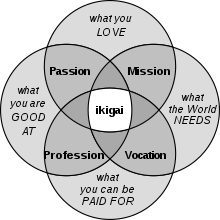04 Jul 2022
Ikigai Philosophy: Understanding Life’s Values and Purpose
Articles,

Have you ever thought about why we live in this world? Why should every deed we do be worthy and in accordance with the heart? Why is there a link between mental or emotional well-being and physical well-being. In this article we will delve deeper into the definition and philosophy behind the meaning of Ikigai.
Ikigai (生き甲斐) is a Japanese concept that combines the terms iki, meaning “life” or “life”, and gai, meaning “benefit” or “value”. Ikigai is understanding the value or purpose of life in dealing with life.
Japanese Ikigai Concept
The concept of Ikigai has evolved from the basic principles of health and wellness of traditional Japanese medicine. This medical tradition holds that physical well-being is influenced by one’s mental-emotional health and purpose in life.
Japanese psychologist Michiko Kumano (2017) says that Ikigai is a state of well-being that arises from devotion to activities that are enjoyed, which also brings a sense of satisfaction.
Michiko further distinguishes Ikigai from temporary pleasures (hedonic, in the ancient Greek sense) and aligns it with eudaimonia (ancient Greek meaning of a life well-lived) which leads to the highest and eternal form of happiness.
Ikigai also resonates with Cognitive Behavioral Therapy’s emphasis on pursuing activities that produce pleasure and a sense of belonging, particularly as a way of alleviating depressive disorders.
Ken Mogi, a neurologist and author of Awakening Your Ikigai (2018, p. 3), says that Ikigai is an ancient and familiar concept to Japanese people, which can be translated simply as “a reason to wake up in the morning” or, more poetically, “wake up with joy.”
Everyone has Ikigai, which is the intersection of their passion, talent, and potential to benefit others. The journey of finding Ikigai in someone may take time, deep self-reflection, and effort, and it is one we can all do.
Elements of Ikigai

The concept of Ikigai as a life goal with personal and social dimensions is captured by the famous Ikigai diagram. This diagram is like elements spanning overlapping planes that include:
- What do you like
- What can be done well?
- What do the world and those around you need?
- What do you do with the ability worth paying for?
What We Like (You Love It)
This scope includes what we do or experience that gives us the most joy in life and makes us feel most alive and fulfilled. What we like in this sense like sailing, writing poetry, rock climbing, singing in a rock band, reading historical novels, spending free time with friends, etc.
What matters most is that we allow ourselves to think deeply about what we love, regardless of whether we are experts at it, whether the world needs it, or whether we can be paid to do it.
What Can Be Done Well (You Are Great at It)
This scope includes any abilities or skills that are highly mastered, such as skills that we have learned, hobbies that are pursued, talents that have been shown from an early age, etc. Dominating skills include playing the piano, empathy, public speaking, sports, brain surgery, or painting portraits.
This scope includes talent or ability, whether we are passionate or not, whether the world needs it, or if we can be paid for it.
What the world needs and around you (The World Needs It)
The “world” here maybe humanity as a whole, the small community we relate to, or something in between. What the world needs may be based on our impressions or needs expressed by others. The world’s needs may include clean water, heating houses, volunteering for certain non-profit organizations, or state training such as military training and others.
This domain connects most explicitly with others and prioritizes doing good for others over one’s own needs.
What We Do With Our Skills Worth Paying For (You Are Paid For It)
This dimension of the diagram also refers to the world or society in general, as it involves what others are willing to pay or “what the market will bear.” for example we are passionate about writing poetry or are very good at rock climbing, but this does not mean we can be paid for it.
Whether we can be paid for our interests or talents depends on factors such as the state of the economy and the interests/talents of interest etc.
Recommended Books About Ikigai That Are Good To Read
The Book of Ikigai by Ken Mogi, Ph.D.
This book tells the inspirational story of the author, Ken Mogi, a brain scientist who shows the miracle of Ikigai in everyone’s life. One of the highlights is the story of Jiro Ono (91 years old), the world’s oldest living three-Michelin-star Chef.
It turns out that Jiro Ono has Ikigai which makes him never get tired of doing the same thing and in detail every day. He finds Ikigai from the smiles of his customers, the awards he gets, or from the cool air at dawn when he wakes up and is getting ready to go to the fish market.
The Secret of Ikigai by Elisa Irukawa
Among the myriad of routines, time is running faster, a person will find it quite difficult to find his life purpose and happiness. Ikigai is an important science that Japanese people apply in fast-paced and chaotic situations to achieve life goals and happiness. Well, this book explores all the secrets about this Ikigai.
That was some description of Ikigai. Whatever obstacles and problems we are facing. With this concept we can continue to move forward to appreciate every journey that is in it.
Want to go to a school that applies a cool teaching method with an international curriculum? You find out more by visiting the link here.
Reference





